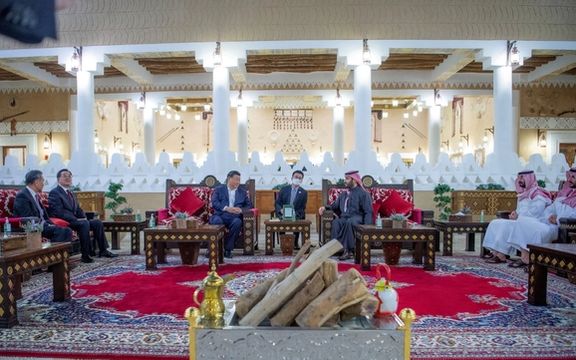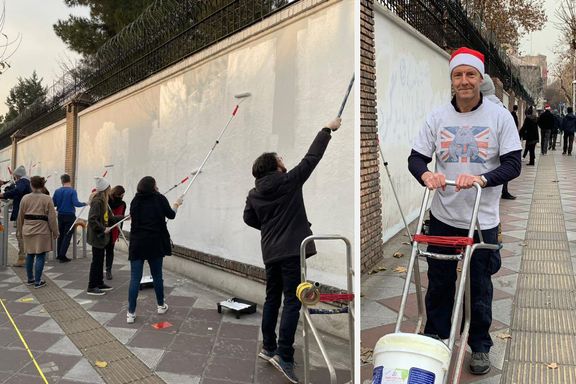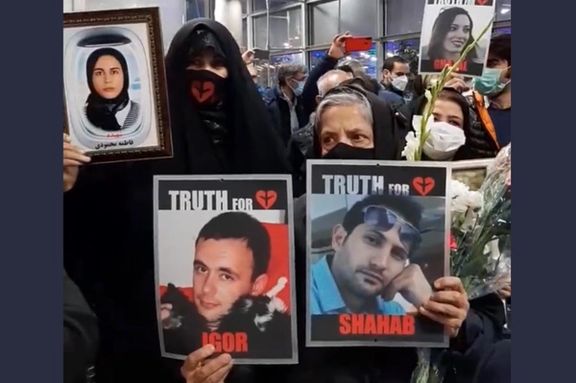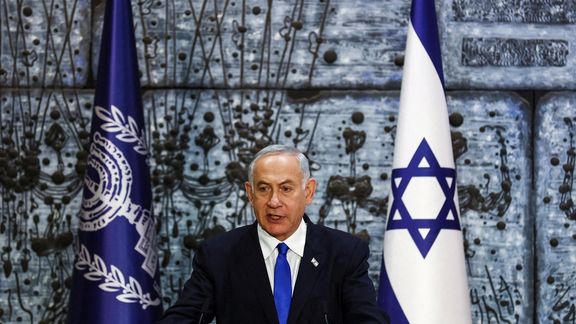US Sanctions Chinese Video Surveillance Firm Supplying Iran

The United States on Thursday blacklisted a Chinese video surveillance equipment maker accusing the company of selling technology to Iran’s Revolutionary Guard.

The United States on Thursday blacklisted a Chinese video surveillance equipment maker accusing the company of selling technology to Iran’s Revolutionary Guard.
NBC News reported Friday that Tiandy Technologies firm has used its facial recognition software to help Chinese authorities identify Uyghurs or other ethnic minorities. It has also provided Iran’s IRGC with the technology as well.
The Commerce Department sanctions against Tiandy restrict American firms from exporting components to the company.
The processors for Tiandy’s video recording systems were provided by California-based semiconductor giant Intel Corporation. However, Intel had removed references to Tiandy from its website before the decision was announced by the Biden administration, added NBC News.
Intel Corp. spokesperson Penny Bruce told NBC News Thursday that the company ceased doing business with the Chinese company “following an internal review.”
Tiandy is a private firm based in the northern city of Tianjin, which ranks among the top video surveillance companies in China and the world.
An industry survey says the annual sales revenue of Tiandy was more than $800 million in 2021, but it has branches in over 60 countries.
The Financial Times also wrote Thursday that Washington is set to put the chipmaker Yangtze Memory Technologies on a trade blacklist, in its latest efforts to target Chinese technology companies that it believes threaten the country’s security.
It comes two months after the Biden administration unveiled harsh export controls that made it more difficult for Beijing to acquire and produce advanced semiconductors.

While many oil industry sources believe Iran exports around one million barrels of crude per day, others believe the volume is much less and the income modest.
TankerTrackers, Vortexa, Kpler, and other sources estimate Iran exported anywhere from 810,000 to 1.2 million barrels of crude oil per day in recent months. Iran keeps the export volume secret, but top officials constantly claim revenues are increasing.
But the US Energy Information Administration estimates that currently Iran’s daily crude exports are around 600,000 barrels. In addition, Iran is selling a maximum of 400,000 barrels of oil products such as diesel per day. So, the estimate about crude exports ranges from 0.6 to 1,2 million barrels, quite a large spread.
Iran also does not reveal how much it earns from crude oil exports, but if we take the lower estimate of 0.6 million shipments p/d and an average price of $90 p/b for 2022, revenues should total $20-22 billion for the 12 months of 2022.
The higher export volume estimate of one million barrels per day would return an annual revenue of about $32 billion.
The oil products Iran exports in addition to crude also generate roughly the same rate of income as crude oil. This means that if Iran has been selling 400,000 barrels p/d of these products, it earned about $13 billion in 2022.
Thus, total oil export revenues for the year ranges from $35-45 billion depending on which crude export volume is closer to reality.
These are rough estimates because we do not know how much discount Iran offers to its main buyer, China, and how much hard currency it recoups from the sales. Many observers believe Tehran might be bartering some of its oil to get food and other necessities. Also, using middlemen and illicit methods to conceal its shipments and repatriate cash amid US banking sanctions cost more money.
The prevailing financial situation in Iran is perhaps an indication that the lower estimate of its 2022 oil income might be closer to reality. Its currency, the rial, has fallen almost 30 percent in the past 12 months to a historic low of 380,000 against the US dollar.
The central bank has accelerated its habit of printing money to finance government operation and rescue inefficient state banks. Media in Tehran reported Thursday that in the past seven months the government has printed 1,000 trillion rials of money, while the currency was losing value.
If Iran’s oil exports were closer to $45 billion perhaps the currency would not have fallen so precipitously, because the exchange market in Tehran is not that big and the infusion of less than $100 million more every few days could have better supported the currency.
Popular anti-regime protests since September have put a lot of pressure on the government, that risks mass rebellion by a nation suffering from a 50-percent inflation rate and growing poverty.
The government’s official news website IRNA claimed Friday that daily exports have reached 1.5 million barrels, perhaps as a tactic to talk up the rial, but that is also a politically dangerous game because a public under tremendous financial pressure can ask where all the income has gone.

Iranians continue critizing both China and their own government for Beijing’s endorsement of a GCC claim over three Iranian islands in the Persian Gulf.
Politicians and pundits criticize their government for its over-reliance on China and Russia, nearly one week after the Gulf Cooperation Council met with Chinese President Xi Jinping and a joint statement was issued, which included a reference to the three islands, signaling Chinese support.
The government in Tehran in turn has voiced some mild criticism of China over the issue. It has said that the GCC statement also signed by Chinese President Xi Jinping undermines its territorial integrity. President Ebrahim Raisi has called on Beijing "to make up for the mistake," but no official response from China has been observed yet.
In a statement on Thursday, December 15, Iran's Reform Front, an umbrella organization of several reformist groups and political parties called China's stance "interventionist and opportunist."Meanwhile, the Reform Front, which is a loyal opposition to the clerical regime said that "This has been one of the worst and the most humiliating development in which Iran's tattered foreign policy has damaged the country's national authority."
The front's statement further expressed "deep regret" about what it called "Iran's foreign policy failure after Iran's involvement in the war in Ukraine based on Russian President Vladimir Putin's initiative."
The strongly worded statement was issued while reformists have been mending their badly damaged ties with the country's authoritarian ruler Ali Khamenei by not supporting anti-regime protests.

The statement added that despite its occasional support for the Iranian regime, China would never miss a chance to take advantage of Iran's internal crises to expand its trade relations with Tehran's regional rivals. It also accused Moscow of the same sort of opportunism by convincing Tehran to get involved in the Ukraine war by supplying drones to Russia.
The unprecedented criticism of Khamenei's ‘Looking East’ policy by reformists continued with an article in the reformist Etemad newspaper by Esmail Gerami-Moghaddam the deputy leader of the reformist National Trust Party. He wrote that China's stance about the three islands sent a signal to the United States that like Washington, Beijing also believes Tehran’s regional ambitions should be checked.
Gerami-Moghaddam added that China preferred trade deals with Arab countries. "This shows that Tehran's policy of supporting stronger ties with China and its Looking East policy was a serious strategic miscalculation." However, Gerami-Moghaddam stopped short of saying that the architect of that policy was no one other than Khamenei.
Meanwhile, he argued that Iran could support Taiwan's independence and said China should accept to negotiate the fate of Taiwan. Gerami-Moghaddam recalled that since 2005 the Chinese insisted in their meetings with Iranian officials that Tehran should solve its problems with its neighbors and the United States.
In an interview with reformist Sharq daily, Ali Fekri the chairman of the Iranian Organization for Investment and Economic Assistance said that China chose not to invest in Iran and to transfer its capital and investments to other Persian Gulf states. He added that attracting foreign investment is not easy because of US sanctions. He maintained that last year, Russia was the biggest investor in Iran, but did not elaborate on the matter.
Iranian political analyst Ali Bigdeli told Nameh News that China's improving relations with Arab states does not mean that US influence in the region will diminish. Particularly, the US military and security relations with Persian Gulf Arab states is far more extensive to be affected with developments such as China's extended trade presence in the region.
Despite all these justifications, criticism of the Iranian government for over-reliance on China may continue for some time. On Thursday, Moineddin Saeedi, the member of Iranian Parliament from Chabahar in Sistan and Baluchistan Province, said at parliament: "Unlimited trust in China and Russia is sheer stupidity." He also criticized the Iranian government for "not giving the right response to China."

A group Iranians citizen in the capital Tehran have voluntarily helped paint the walls of the British embassy vandalized with anti-UK slogans.
The slogans had been seemingly sprayed by some pro-regime elements to protest UK’s support for anti-government protesters in Iran and condemn the violation of their rights.
Britain summoned Iran's most senior diplomat in London on December 9 to protest the hanging of Mohsen Shekari, the first such execution over ongoing antigovernment unrest.
British envoy to Tehran Simon Shercliff in a tweet on Thursday thanked Iranians and international friends from Germany, South Korea, France, Italy, Brazil and some other countries who sympathized with the UK.
Photos on social media show that Shercliff himself is also helping people to paint the walls.
This is not the first time the UK embassy is vandalized by pro-regime hardliners. In 2011, the embassy was attacked by amob of Basij militia and hardliner activists who ransacked offices and stole documents. One small building was also set on fire during the incident and several people were injured.
It came after the UK strongly supported punitive international sanctions imposed over Iran's nuclear program and in response Iranian parliament voted to downgrade ties with Britain and in effect expel the UK ambassador.

Iran's Islamic regime has held the third hearing of a trial for a group of IRGC personnel it says are responsible for shooting down a Ukrainian airliner in 2020.
The hearing session was held Thursday after a one-year gap with the presence of ten defendants.
Flight PS 752 was hit with two surface-to-air missiles as it was taking off from Tehran on January 8, 2020, in the tense aftermath of Iran's missile attack on United States military bases in Iraq. The missile attack on US bases was in retaliation for the US killing of Iranian general Qassem Soleimani in Baghdad days earlier.
All 176 onboard the jetliner died but for three days the government lied about shooting down the plane.
Without mentioning any names, the regime’s judiciary only said ten defendants from different military ranks were present.
The Association of Families of Flight PS752 Victims, however, warned Wednesday that the Islamic Republic is “planning yet another mockery of justice” in a military court.
In a statement the Association stated, “Tehran’s military court will be resuming its show trials on the downing of flight PS752, which claimed the lives of 176 innocent passengers and crew, along with an unborn child.”
Based on the information obtained, added the statement, not a single high-ranking or even mid-level officer or commander of the armed forces are among the accused.
“The case and charges are based on a false theory of negligence and human error. There have been no independent experts to investigate the case. Everything has happened behind closed doors and without any transparency towards the families of the victims,” reads the statement.

The families have instead endured and resisted nearly three years of “persecution, intimidation, threats, and sometimes deceitful offers of compensation,” it added.
Families of flight PS752 victims underlined that in recent days, the world witnessed how “innocent civilians were summarily tried and executed with no due process. Meanwhile, the culprits who ordered or carried out the orders to shoot down a civilian airliner continue to roam around with full impunity after nearly three years.”
The Islamic Republic recently executed two protesters, Majidreza Rahnavardand Mohsen Shekari in less than a week after charging them with either killing or injuring government agents during anti-regime protests sparked by the September death of 22-year-old Iranian woman, Mahsa Amini in police custody.
At least 494 people have been killed in the demonstrations amid a heavy-handed security crackdown, according to human rights groups. More than 18,000 have been detained by authorities.
“It is our duty to inform the public of the nefarious plots of the Islamic Republic thugs and their leaders,” families of flight PS752 victims stressed, underscoring that the regime “intends to close this blood-stained file in silence and at a time when the West is on holidays.”
They stated that Supreme Leader Ali Khamenei, IRGC Commander Hossein Salami, Secretary of the Supreme National Security Council Ali Shamkhani, Chief of Staff for the Armed Forces Mohammad Bagheri, Commander of IRGC’s Aerospace Force Amir Ali Hajizadeh, and many others among the highest ranks of the Islamic regime are “the real culprits behind this crime and must be put on trials.”
Some parents of the victims also boycotted the proceedings last year, saying that the trial of those allegedly responsible lacks transparency and due process.
The families of victims have filed a lawsuit at the International Criminal Court to investigate the case as a war crime or crime against humanity.
In May 2021, some family members also filed a civil lawsuit against the government and senior officials they believe were to blame for the incident. Canada’s Ontario Court ruled that the downing of the plane was an intentional act of terrorism.

In an interview with al-Arabiya, Benjamin Netanyahu has reiterated opposition to the 2015 Iran nuclear deal and urged Saudi Arabia to ‘normalize’ with Israel.
Netanyahu, who is working for a government with militant settler and Otzma Yehudit party leader Itamar Ben-Gvir as security minister, praised the Middle policies of former US President Donald Trump.
Israel’s US-sponsored 2020 ‘normalization’ agreement with the United Arab Emirates, Bahrain, Morocco and Sudan had broken with an “old groove” and the “same rabbit holes” represented by the 2002 Saudi-drafted Arab Peace Initiative (API), Netanyahu said. The API, which remains Arab League and Saudi policy, made recognition of Israel dependent on a viable Palestinian state in the Israeli-occupied West Bank and Gaza.
Netanyahu, however, urged the United States to reaffirm its commitment to Saudi Arabia and pledged to pursue formal Israeli ties with Riyadh for a "quantum leap" in peace.
"The traditional (US) alliance with Saudi Arabia and other countries, has to be reaffirmed. There should not be periodic swings, or even wild swings in this relationship, because I think that the alliance...is the anchor of stability in our region," he said.
‘Atomic arsenal paved with gold’
Netanyahu called the JCPOA (Joint Comprehensive Plan of Action), signed by world powers in 2015, a “horrible agreement because it allowed Iran basically with international approval, to develop a nuclear and basically an atomic arsenal paved with gold, with hundreds of billions of dollars of sanction relief.”
Before Trump withdrew the US from the JCPOA in 2018, the International Atomic Energy Agency had extensive inspection powers that it used to verify Tehran’s compliance with strict nuclear limits. Iran has since 2019 responded to US ‘maximum pressure’ sanctions by boosting the nuclear program far beyond JCPOA limits.
However, the JCPOA had sunset clauses that over time would end many restrictions imposed on Iran’s nuclear program.
Netanyahu made clear his opposition to any agreement with Iran. “Who cares what they sign? It doesn’t mean anything. They sign and they violate, they cheat as fast as they sign. And you certainly shouldn't make agreements with them that are bad if they keep the agreement, which is what I think the JCPOA was.”
But the development of the Iranian nuclear program since 2019 has left Israel with little choice, the prime minister designate said, while a change of mood in Washington with the current unrest in Iran had made JCPOA renewal less likely.
Lebanon maritime agreement ‘tactical’
“A lot of people now across the board in many lands say: ‘You really cannot go back to the JCPOA and we have to do everything in our power to stop Iran from having a nuclear arsenal.’” Israel was prepared to take military action, with or without US support, to stop the Iran nuclear program, Netanyahu insisted.
He also ruled out agreement with Iranian “proxies,” calling “tactical” the October 27 US-brokered maritime agreement with Lebanon that designated sea areas to enable offshore gas exploration. Hezbollah, the Iran-allied Shia party, ruled in Lebanon, Netanyahu insisted: “Let’s be open about that. But without Iranian support, they’d collapse overnight.”
Netanyahu, whose Likud Party famously in 2019 raised a banner of him with President Vladimir Putin on its Tel Aviv headquarters, defended Israel’s relationship with Russia, emphasizing the need for intelligence cooperation with both states flying jets in Syria. He said he would “look into” Ukraine’s request for weapons from Israel once he took office.